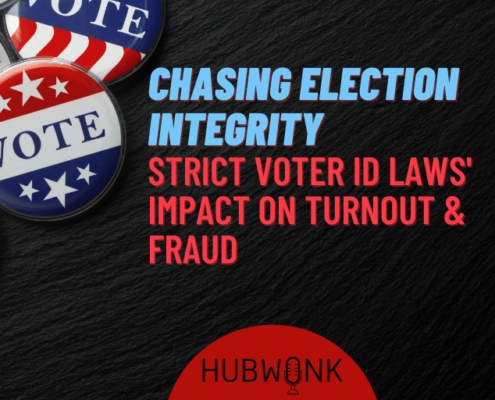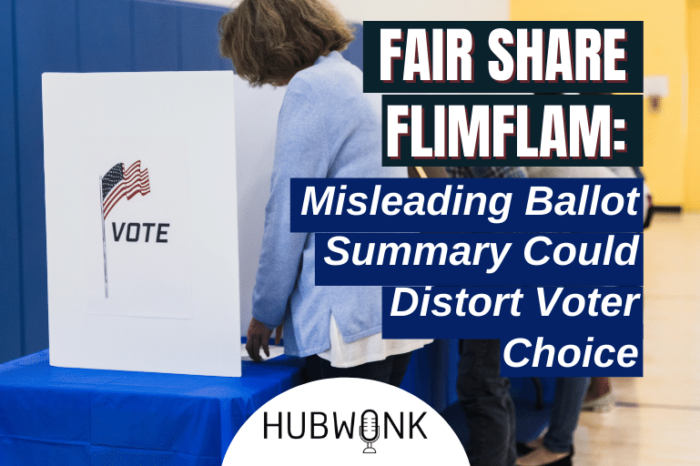Fair Share Flimflam: Misleading Ballot Summary Could Distort Voter Choice
/in Blog: Economy, Economic Opportunity, Featured, Podcast Hubwonk /by Editorial StaffHubwonk host Joe Selvaggi talks with attorney Kevin Martin, appellate litigator at Goodwin Proctor, about the complaint filed with the Massachusetts Supreme Judicial Court regarding the summary language on the 2022 “Fair Share Tax” ballot initiative. Kevin explains how the language misleads the public about the impact of their vote on revenue, spending, and our state’s constitution. Related: Pioneer Supports Legal Challenge to Misleading Tax Ballot Language, Releases Video
Guest:
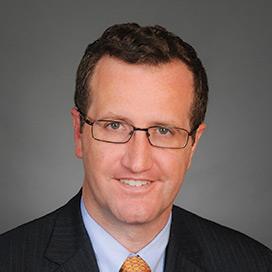 Kevin P. Martin is co-chair of the Appellate Litigation practice at Goodwin, where he has practiced since 2001. Mr. Martin has argued and briefed numerous cases in federal and state appellate courts around the country, and also has extensive experience in both trial matters and internal and government investigations. Prior to joining Goodwin, Mr. Martin clerked for Justice Antonin Scalia on the United States Supreme Court and Judge Laurence Silberman on the U.S. Court of Appeals for the District of Columbia Circuit. Mr. Martin is a fellow of the American Academy of Appellate Lawyers. The Legal 500 has noted that Mr. Martin is known as an “excellent writer, advocate, and strategist.” He is ranked a “Star” for Appellate Litigation in Massachusetts by Benchmark Litigation, and has been named a “Lawyer of the Year” by Massachusetts Lawyers Weekly for his work before the Massachusetts Supreme Judicial Court (SJC). He also has been recognized by the Boston Business Journal as one of its “Power 50,” an annual listing of top executives and “movers and shakers” in the Boston economy. Mr. Martin is a member of Goodwin’s Pro Bono Committee.
Kevin P. Martin is co-chair of the Appellate Litigation practice at Goodwin, where he has practiced since 2001. Mr. Martin has argued and briefed numerous cases in federal and state appellate courts around the country, and also has extensive experience in both trial matters and internal and government investigations. Prior to joining Goodwin, Mr. Martin clerked for Justice Antonin Scalia on the United States Supreme Court and Judge Laurence Silberman on the U.S. Court of Appeals for the District of Columbia Circuit. Mr. Martin is a fellow of the American Academy of Appellate Lawyers. The Legal 500 has noted that Mr. Martin is known as an “excellent writer, advocate, and strategist.” He is ranked a “Star” for Appellate Litigation in Massachusetts by Benchmark Litigation, and has been named a “Lawyer of the Year” by Massachusetts Lawyers Weekly for his work before the Massachusetts Supreme Judicial Court (SJC). He also has been recognized by the Boston Business Journal as one of its “Power 50,” an annual listing of top executives and “movers and shakers” in the Boston economy. Mr. Martin is a member of Goodwin’s Pro Bono Committee.
Watch:
Get new episodes of Hubwonk in your inbox!
Read a Transcript of This Episode
Joe Selvaggi:
This is Hubwonk. I’m Joe Selvaggi.
Joe Selvaggi:
Welcome to Hubwonk, a podcast of Pioneer Institute, a think tank in Boston. The Massachusetts constitution requires its legislature to set income tax rates with one important caveat. That rate must be the same for everyone. This so-called flat tax mandate is currently being challenged by a legislative amendment. Legislators have voted to add a 2022 ballot question to create a graduated tax system that would add an additional 4% to the existing 5% to all income above 1 million advocates for this 80% increase in marginal tax rates, promise to dedicate this additional revenue exclusively to education and transportation. Indeed, the ballot summary of a nearly identical 2018 failed measure explicitly linked the tax increase to a promise to use funds in the same way. The wording of the November ballot quest is likely to make the same promise, but would this ballot measure actually require the new revenue to be added to the current education and transportation spending?
Joe Selvaggi:
And if not, should the wording of the ballot measure be required to inform voters of that fact before changing our state’s constitution. My guest today is Kevin Martin, attorney at Goodwin Proctor. Mr. Martin has filed a complaint with the Supreme Judicial Court of Massachusetts, that objects to the likely wording of the graduating income tax ballot question. The court will need to determine whether wording that promises a link between revenue and spending is misleading. And if so, if it must either be changed or have the ballot measure removed entirely from our November election, Mr. Martin will describe the processes for amending our state constitution and share his views on why accurate ballot summaries are essential to the integrity of our democratic system. When I return, I’ll be joined by attorney Kevin Martin. Okay. We’re back. This is Hubwonk. I’m Joe Selvaggi, and I’m now joined by attorney Kevin Martin. Welcome to the podcast, Kevin.
Kevin Martin:
Hi, good morning, Joe. Nice to be with you.
Joe Selvaggi:
Okay. Now we’re going to talk about the complaint you filed with the Massachusetts Supreme Judicial Court, the SJC which was a challenge to the Attorney General’s and the Secretary of the Commonwealth’s wording on a ballot measure. That’s imminent in our election in November 2022. But I want to give our listeners some background on you and your role. I assume not everyone knows what an appellate litigator is. You are one, so why don’t you give our listeners a sense of what you do in the process?
Kevin Martin:
Sure. So I’m a partner at the law firm, Goodwin, Proctor and Goodwin, like a lot of large law firms, has its attorneys specialize in something. And my specialty is courts of appeals and Supreme courts. I joined Goodwin about 20 years ago after clerking on the US Supreme court. And I do some trial work, but for the last decade or so, I really have focused on cases that are at the US Supreme court, the Massachusetts Supreme judicial court, or other courts of appeal in Massachusetts are around the country. You know, we typically will step in when the trial is over. Although sometimes we get involved at the trial level too just to make sure the issues are being set up the right way for an eventual appeal. And we are in, if I had to draw an analogy to the sports world, I’d say we’re like the closer in baseball. We come in in the ninth inning and if you’re already up, then we try to preserve the victory. Or maybe if, you know, it’s close and late, we come in and try to turn things around so that, you know, a loss at the trial level isn’t the final result.
Joe Selvaggi:
So you want to make sure the legal system is fair and everybody got a fair shake. You’re there to sort of challenge any sense of improper order. Can you give our listeners a sense of where you’ve sort of stepped in as that ninth inning relief pitch and saved some people from otherwise unjust outcomes?
Kevin Martin:
Sure. So, you know, one example involves a series of cases we brought on behalf of homeless people around New England and elsewhere in the country, you know, many local governments have put in place laws that prevent people from asking for charity or even politically campaigning in certain parts of town. And so our group of constitutional lawyers here at Goodwin came in, we brought lawsuits and cities like Worcester and Lowell, Portland, Maine. And in every instance, we convinced the court of appeals that the law infringed the first amendment rights. You know, again, both of whether it’s homeless individuals asking for charity or politicians who wanna hold campaign signs in parts of town or in, you know, traffic rotaries.
Joe Selvaggi:
Wonderful. So let’s talk about the ballot question. We’re talking about an effort to change the Massachusetts state constitution a Constitution’s older than our, our national constitution. I believe it’s the oldest in the country. It’s a fairly cumbersome process to amend a constitution is what is the process and is it deliberately difficult to change the constitution?
Kevin Martin:
Right? So whether it’s the Massachusetts constitution or the US Constitution, it is deliberately difficult to change for a very important reason, which is that constitutions binding the hands of the political branches of government, the governor, you know, Congress, the Massachusetts State House you are putting in place a principle that is supposed to be designed to last for a long period of time, and to reflect the really core principles of society in Massachusetts to amend the constitution. You need to either have a petition initiative 10 members of the public have to come up with an idea for a proposed constitutional amendment, or the legislature needs to come up with the idea and the proposal needs to go through two separate of the state house of representatives, and Senate, and be approved by a majority both times that that process takes four years. And then even once that’s done, you need to then put the measure on the ballot so that the citizens of Massachusetts get a chance to vote on it as well.
Joe Selvaggi:
So this ballot initiative or this ballot measure is designed indeed to do just that amend our constitution. What is the change that this ballot question hopes to achieve?
Kevin Martin:
So the ballot question, that’s at issue and our litigation hopes to change the constitution, to do something which has never been done before, which is embed a particular 10 tax rate in the state constitution. It’ll be a 4% tax on all incomes over a million dollars, no matter how earned. So, you know, venture capitalists would have to pay it, but if you sell your house, which has appreciated over the years, or if you sell your small business or your family farm, and you get more than a million dollars in income from that sale, then you would be hit by the tax too. The constitutional amendment says that the money needs to go to education and transportation, but that’s misleading. And that’s what the litigation is all about.
Joe Selvaggi:
So I understand I’ve lived here Massachusetts quite a long time, and I’ve heard this case made in the past. I think it’s maybe five times in the past that something like this has been tried and even as recently as 2018, it tried and failed. I believe it was the Mass Supreme Judicial Court that found the ballot initiative unconstitutional as a bit of history. What were the problems in 2018 that made this be found unconstitutional?
Kevin Martin:
Right? So, as I described, there are two ways to amend the state constitution. One way is through a petition initiative. Something that 10 members of the public come up with another way is a proposed amendment that originates in the legislature in 2018 proponents of this graduated income tax, tried getting it on the ballot using an initiative petition, but there are certain limits in the state constitution on what proposals can go on the ballot through that process, what the SJC found back in 2018 was that the subject matter of this tax and the dedication of spending to education and transportation was inappropriate for an initiative petition. But those same rules don’t apply to constitutional amendments that originate in the legislature. And so what is going to be put on the ballot potentially this year is simply a repackaging of that 2018 measure, but initiated through the legislature rather than an initiative petition.
Joe Selvaggi:
So it’s got a new label. Therefore it has a different process. I’ve read what was written in 2018, and I’ve read what is proposed in 2022. Is this simply deja vu? Did they literally leave the wording the same and just change the process? And if so did they do what they needed to do to satisfy at least the process of amending the constitution?
Kevin Martin:
They have literally taken exactly the same language and just use a different process to try to put it on the ballot this year. But there are multiple procedural issues involved in amending the constitution. And another very important procedural protection is the requirement that the Attorney General and the Secretary of the Commonwealth provide voters fair and not misleading summaries of what the actual proposal is. There’s not a requirement that people voting on ballot measures read the entire actual ballot measure. They get to look at a summary of it. And the problem that we’ve identified this year is that the summary that we believe the Attorney General and the Secretary of the Commonwealth intend to use is not fair and is misleading about where the money raised by this tax will actually be spent.
Joe Selvaggi:
So your issue is not with the process, but rather with the wording of the ballot measure itself. Why is the way a ballot measure is worded so important to a voter in the voting booth?
Kevin Martin:
Plus we were saying at the beginning of the podcast, constitutional amendments are supposed to be hard. They happen only every so often. There’s a lengthy process. You need to go through to have a constitutional amendment and constitutional amendments binding the hands of the political branches of the governor and of the legislature. So when citizens are asked to vote at the end of this very lengthy process, and whether to prove the amendment or not, it’s, it’s really crucial that they understand exactly what they’re, what they’re voting for, that they not be misled into approving a constitutional amendment, that if they were provided more accurate information, they would actually oppose. And the problem we have with this particular amendment is this, when you look at the language on the ballot measure, when you look at the summary that we believe will be, will be used, there’s a reference to education and transportation, spending public education, public transportation, the proponents of this graduated income tax have, have put references to those two areas of spending into the ballot measure.
Kevin Martin:
Because on five prior occasions, voters were asked to approve a graduate income tax without any kind of dedication of the money. And every single time they’ve rejected, the graduated income tax, the thought is that by tying the tax to two areas of spending that are popular with voters, public education, public transportation you will get voters to, to approve this most recent proposed tax increase. If voters know where the money’s gonna go, and if they’re happy with where the money’s gonna go, then they’ll vote for the tax. The problem is that the way the state budgeting process works, there’s actually no guarantee the money will be spent on those two purposes. And we want to make sure that voters are made aware of that.
Joe Selvaggi:
So you’re saying that the way the ballot question is asked and worded on the ballot will change actually change voter preferences. In other words, if it’s written one way, they like it. If it’s written a different way, they don’t. Do you have data to support that?
Kevin Martin:
We do actually have data. Joe, we didn’t just file this lawsuit based upon our say so as lawyers. We took a poll we got one of the most highly regarded polling organizations in the country to take a poll last fall. And they asked voters first if they would support the tax if they thought the money was going be going to education and transportation. And then they were asked again, would you support the tax if the legislature retained discretion about how to spend the money? And the results were absolutely striking when voters thought and were told that the money would need to go to education and transportation, a slim majority supported the tax. But when they were told that the legislature actually would have discretion over where the money’s spent, then it flipped and a plurality – a majority, of those who took a position said that they no longer supported the tax increase.
Joe Selvaggi:
So your concern is that it’s not merely a ballot summary, but it’s actually a sales job. And and in fact an inaccurate sales job to make the the initiative more appealing to the voter.
Kevin Martin:
That’s exactly right. In fact, another question we asked poll respondents was, you know, if you were told that the money would need to go to education and transportation, but then you found out that the legislature could spend the money on whatever it wanted to, would you feel misled? And so 72% of poll respondents, and it was, it was remarkably consistent, Democrats, Republicans, independents, around 72% said they would feel misled if they were told the money would need to go to education and transportation, but then it actually wound up being used for something else.
Joe Selvaggi:
So your complaint is again with the way the ballot measure is worded. How, what would you like to change, or what would you like to take away or add to that ballot question to make the question more actively reflect the effect of the voter’s choice on the constitution?
Kevin Martin:
So Joe, you mentioned litigation that took place back in 2018, over the previous version of this very same ballot question. And back in that litigation, the Attorney General in her brief to the state Supreme Judicial Court described how this amendment actually works in practice. And what the Attorney General said in that brief was that the legislature would retain complete discretion. And if the legislature wanted to, then it could reduce spending on education and transportation that comes out of the general revenue fund and simply replace it with the money raised by this new tax resulting in no net overall increase in education and transportation spending. But the legislature could basically basically play a shell game with the money, give with one hand, take away with the other what we would like the state SJC to do, the state Supreme Court to do is, take language from the Attorney General’s own brief from back in 2018 and use the Attorney General’s own language in the summary that goes to voters this time. We’d like voters to be told that nothing in the proposed amendment prevents the legislature from reducing spending on education and transportation from the general revenue fund and just replacing it with this new money.
Joe Selvaggi:
So, so you’re effectively making the point that all tax dollars are fungible, right? It can’t be earmarked. So if we take in, let’s say, a billion dollars and we promise to give it to education the legislature can reduce the historic funding by a billion dollars, direct the tax new tax to education with a billion dollars effectively having to spend not one penny more on education and have satisfied in a sense, the promise that the money from the tax went to education. When in fact it didn’t raise education funds by one penny.
Kevin Martin:
That’s exactly right. In fact, if you look at the state budget over time in recent years, about $10 billion have been spent on education and transportation by the state, the new tax is predicted to raise, you know, somewhere between $1.5-2 billion, depending upon how many millionaires leave the state, how many small businesses don’t get sold as a result of the tax. So the legislature could simply reduce spending on education and transportation from the general fund by that amount. It’d still be $8.5 billion left replace it with the $1.5-2 billion from this new tax. And, you know, they’ve now freed up $1.5-2 billion to spend on whatever they want without running a file of the purported earmark that appears in the constitutional amendment
Joe Selvaggi:
Indeed. So now your complaint is against the Attorney General Maura Healy and the Secretary of the Commonwealth Mr. Galvin. Is this complaint, that you filed very recently, the first time they learned about your objections to the way the ballot measure was written?
Kevin Martin:
No. So we actually, after taking the poll I talked about went to the Attorney General and Secretary Galvin with the poll results and with our legal argument. And ask them back in November to let us know exactly what language they intend to use in their summaries that are sent to the voters, and that appear on the ballot and to take into account the concerns we were raising. We warn them that if they did not address our concerns, then we would most likely file a lawsuit. And, you know, we never heard back one way or the other, whether they would change the language. Now, unfortunately, there were some timing restrictions on when we can file our lawsuit ballots have to get printed and mailed out all voters get a booklet in the mail. The summaries of these ballot measures, those need to be printed and mailed out well in advance of the actual election.
Kevin Martin:
And so the state Supreme Court has asked people bringing the kinds of challenges that we are bringing to file their lawsuits by no later than February 1st of the election year. And, to allow that to happen, the state Supreme Court asked the Attorney General & the Secretary to release their summary language by no later than 20 days before February 1st this year, that wound up being January 12th. January 12th came and went. We never heard. And so we filed the lawsuit on January 27th, you know, just kind of getting in under the wire before that February 1st deadline. And what we’ve challenged in the lawsuit is the language that the Attorney General and Secretary proposed to use back in 2018 for the identical ballot measure before it was stricken from the ballot by the court in response to our lawsuit that year.
Joe Selvaggi:
Are you confident that that is indeed what would have been, or will be the wording of the ballot measure in 2022? Or is that your best guess?
Kevin Martin:
It’s a best guess, it’s the identical ballot measure. So I don’t see why they would change the language hopefully in response to our lawsuit they’ll take a new account on our concerns and change it voluntarily. But if not, then we intend to litigate this all the way through at the state’s Supreme court. I
Joe Selvaggi:
See. So now we established at the beginning of the show you’re an attorney people hire you to help them your clients that you’re representing in this particular case. Is it just a general group is it a partisan issue? Is this a one party or another or is it a small group of people, millionaires, who don’t like paying their taxes? Who is it that is taking the time to challenge this ballot measure?
Kevin Martin:
Right? So it is, it’s a bipartisan group. When it comes to issues like how the constitution gets amended and what should be in the constitution, you actually find political divides, start to break down. Some people who might even be in favor of higher taxes, don’t like the notion of higher taxes being locked into the constitution. So this lawsuit is, is being supported and is comprised of a very bipartisan group of plaintiffs. In fact, one of our plaintiffs is a democratic member of the state house of representatives. It’s being spearheaded by the Massachusetts high technology council, which is a group representing some of the most important companies in the Massachusetts economy who are concerned about the impact of this measure on good governance and on the, on the economic atmosphere in our state. And it’s not limited to a millionaires. We have, you know, small business people, the state representatives, I mentioned, you know, people who were just concerned about what the effect will be on people selling their family home or their family farm.
Joe Selvaggi:
So yes, we’ve had Chris Anderson from that organization on the show in the past. Also we’ve had discussions about the fact that those who make a million dollars may make it only one time in a lifetime, after selling a family business that they’ve grown over several decades. So one who makes more than a million is not a millionaire. Now you said it’s bipartisan. I don’t want to overly generalize, but there may be. So let’s say a greater propensity to want to tax people on the majority party or the Massachusetts Democratic Party. What is it that the Democrats or a Democrat might not like about this particular ballot measure?
Kevin Martin:
You know, so, so speaking out of my legal role in talking, you know, a little more broadly here I mean, like when you, when you put something in the constitution, you really are tying the hands of the legislature and, you know, this is one particular ballot measure, setting one particular tax to deal with two particular areas of spending. But you look at a state like California, where once these things begin to proliferate, suddenly you have the state constitution chalk full of earmarks to different causes, chalk full of different taxes. And if it turns out, you know, one of these measures is a bad idea. Maybe we don’t want the money going to transportation because that’s adequately funded. Maybe we need more money for healthcare to deal with a pandemic. Well, if the state constitution dictates where the money needs to go or dictate what the tax needs to be, then if you find that small businesses are leaving, the state and tax collections are actually going down, you have to wait, you know, at least 4 years and go through this lengthy process in order to fix the problem.
Kevin Martin:
So I would say that anyone who, you know, who wants the legislature to be nimble to deal with, with problems as they arise and to be flexible in deciding who will get taxed, how much and where the money will go, should be very leery of baking these things into the state constitution.
Joe Selvaggi:
We’ve covered on Hubwonk in the past some of the potential negative repercussions of such a tax. We talk about what happens in Connecticut or in California. So what you’re saying is the reason to be particularly cautious, even if you’re a democratic legislator is that it’s just as difficult to undo a bad idea as it is to implement a good idea.
Kevin Martin:
That’s exactly right, Joe, and there’s another good government issue here, which is highlighted by this lawsuit, which is that you just don’t want voters to be tricked into voting for something that they don’t actually approve. And so, you know, based upon our polling data, I think everyone should be concerned about the notion that based upon how a ballot measure is worded voters might be, might be approving something that they’re actually opposed to, you know, that can cut both ways. And certainly there have been ballot measures in the past that have been sponsored by more conservative groups and, you know, no one should want more conservative groups to use trickery in the wording of summaries in order to get ballot measures across the finish line. Just like in this, this case, you know, we think that a tax increase should not be dragged across the finish line through a misleading summary
Joe Selvaggi:
Indeed. So it cuts both ways. You, you want it, the ballot measure to be clear. So the ballot so that this very important issue is understood and then a, a voter preference can be captured. And you don’t want a sales pitch or something misleading to persuade people when that, that sales pitch is inaccurate. Let’s, let’s just get to the brass tacks, if your complaint is successful what are the options for the judge to fix or this ballot initiative,
Kevin Martin:
Right? So the state Supreme court has, has two options based upon two different aspects of our challenge. You know, one thing we’re challenging is the summary that goes to voters, that’s a somewhat lengthy even though it’s called a summary, it can be somewhat lengthy and it provides an overview of what the ballot measure will do, what changes it will make might be a few paragraphs long. If that is misleading, the state Supreme court can’t actually order different language to be used. And so its only option is to keep the ballot measure off the ballot entirely. So we’d be getting rid of the ballot measure for this year. Now we don’t actually know what summary the attorney general is proposing for year yet, because again, they didn’t meet that mid-January deadline. And so if the attorney general changes the summary language to, to reflect what we think should be on the ballot, then that aspect of our case goes away.
Kevin Martin:
The other option, the other possibility is that there needs to be a, a one sentence description on the ballot of what a yes vote will do. And what a no vote will do now, the state Supreme court does have the ability to order different language to be used there. And so we have asked the state Supreme Judicial Court to order the secretary of the Commonwealth and the Attorney General to use a one sentence yes statement, which clarifies the discretion legislature still has to use the money, however they want to. So, you know, another possibility is it stays on the ballot, but with that amended one sentence yes statement.
Joe Selvaggi:
So our listeners like to learn, but they also like to act on their information. For listeners who are concerned that the ballot measure may be misleading in its wording, is there anything a listener, whether they be ordinary citizens of voters or legislators or the Attorney General for that matter what can people do to, in a sense, join the cause? And, if we get the ballot measure at all, we get an accurate or clear ballot measure.
Kevin Martin:
Sure. So for purposes of the litigation, and I’m a lawyer, I’m in the litigation, there might be a separate political campaign, but I’m not involved with that. You know, you can file briefs at the state Supreme Court are called amicus briefs. Amicus is just Latin for friend. And so they’re a friend of the court briefs. And it’s a way for people other than the actual parties to the case, to make their voices heard in the litigation. You know, the last time we had this type of case in 2018, there were about a dozen amicus briefs filed on both sides of the issue. And so, you know, people who are interested in this case should think about what groups they belong to, the trade associations other civic groups that might be interested in filing a brief with the court to really emphasize to the court how important this concept of a fair, not misleading summary of the ballot measure is to citizens and voters around the state.
Joe Selvaggi:
And how long if this call to arms, if you will how long does the SJC have to ruminate on this question and render its opinion, is this an extremely time-dependent issue?
Kevin Martin:
Again, because they need to get the materials out to voters by the summertime. So, you know, we filed our complaint in late January briefing will take place over the next couple of months. I expect an argument to occur at the state Supreme Court sometime in early spring and a decision to come out from the court by no later than probably June.
Joe Selvaggi:
Well, that’s wonderful. And is there any way for bystanders to follow the progress of this initiative?
Kevin Martin:
Sure. So I know Pioneer, for example, has been posting materials about this case to its website. The Mass High Tech Council has as well. I believe there were about a dozen stories in the media about the complaint when it was filed yesterday. So it’s a high-profile, important issue in the state. And so various groups, again, like Pioneer are a great resource to follow the litigation.
Joe Selvaggi:
Wonderful. Well, we’ll leave it there with a fantastic pitch for Pioneer a wonderful institution. So I want to thank you very much, Kevin, for being my guest on Hubwonk.
Kevin Martin:
Hey, great talking to you, Joe, take care.
Joe Selvaggi:
This has been another episode of Hubwonk, a podcast of Pioneer Institute. If you enjoyed today’s episode, there are several ways to support the show and Pioneer Institute. It would be easier for you and better for us if you subscribe to Hubwonk on your iTunes podcast catcher. If you’d like to make it easier for others to find Hubwonk, it’ll be helpful if you offer a five-star rating or a favorable review, it’s always welcome. If you wanted to share Hubwonk with friends, if you have ideas for me, or suggestions or comments about future episode topics, you’re welcome to email me at hubwonk@pioneerinstitute.org. Please join me next week for a new episode of Hubwonk.
Recent Episodes:
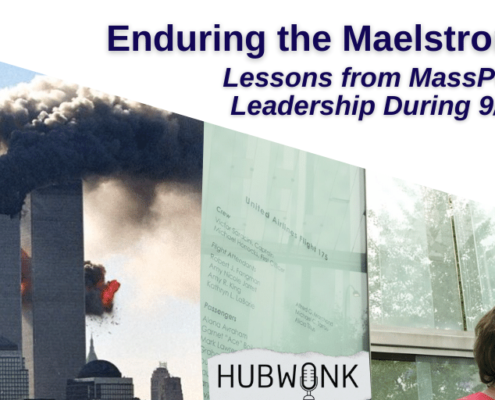
Enduring the Maelstrom: Lessons from MassPort Leadership During 9/11

Rescuing Afghan Refugees: Finding Redemption amidst the Wreckage of Collapse

Untangling Variants & Outbreaks: Can Vaccines & Natural Immunity Outrun Delta?

Targeting Pharma: Infrastructure Bill Employs Price Controls To Offset Unprecedented Price Tag
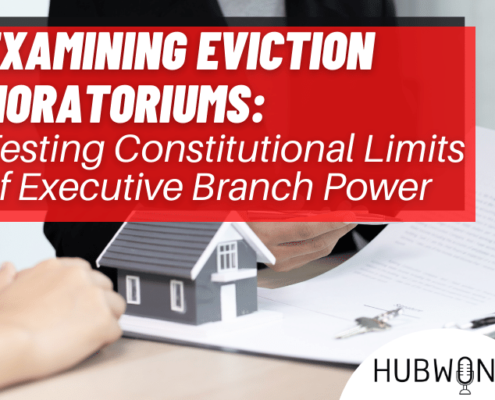
Examining Eviction Moratoriums: Testing Constitutional Limits of Executive Branch Power
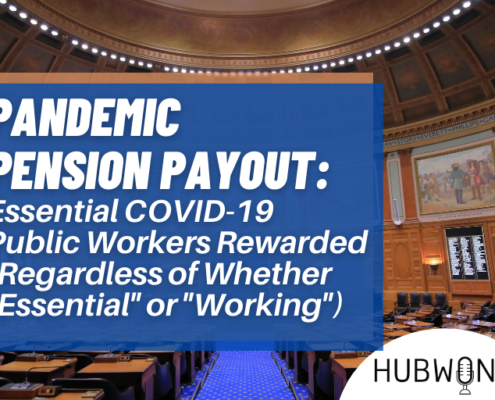
Pandemic Pension Payout: Essential COVID-19 Public Workers Rewarded Whether Essential or Working
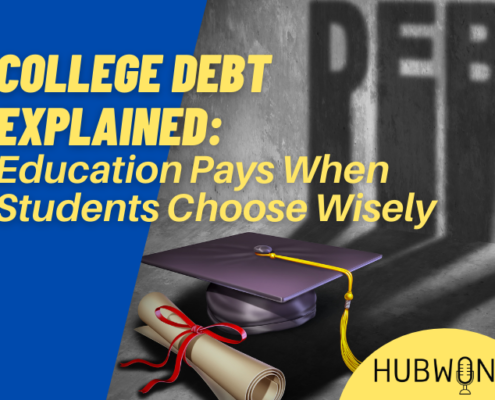
College Debt Explained: Education Pays When Students Choose Wisely
